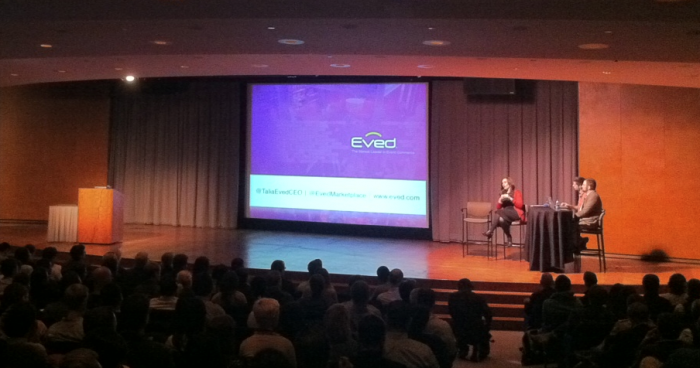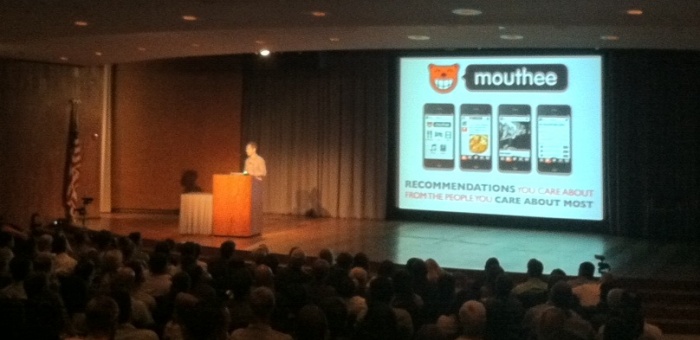
Talia Mashiach is passionate about revolutionizing the event and hospitality industry through innovative technology. She is the founder and CEO of Eved, a custom online marketplace for the meeting and events industry.
Prior to launching Eved she started an event services and destination management company called ACCESS Chicago. Despite launching with small, local hotels as clients, Mashiach was able to acquire big names quickly: only four months in she had secured the Hilton Chicago and the Palmer House Hilton as clients. ACCESS provided in-house services that used the latest technology. Combined with her experience in the event industry, it was the perfect launching pad for Eved.
Eved transforms the meeting and event industry from an outdated, manual, highly fragmented and traditional services sector into a comprehensive online marketplace. Eved supplies procurement tools for the buyers that help them find the small suppliers while giving these small businesses a way to easily create proposals online.
This up-to-date solution allows all aspects of the industry’s supply chain to source, market and transact commerce on a global scale. This week they celebrated $20 million of event commerce going though their services.
But Eved was not an overnight success. Mashiach likens the process of creating a successful company to building a 50-foot wall with heavy bricks. To overcome this struggle “you really have to believe in your idea, believe in yourself and know that you are going to follow through with it. If you can visualize that wall, it will give you that energy to keep moving those bricks and inspire everyone around you to help build your company,” Mashiach said.
To overcome these challenges and learn to appreciate her struggles Mashiach shifted the focus to what can be learned during these challenges and how they can help you grow. This positive outlook will also help you attract your initial clients, an important step when trying to bring you business to the next level. She recommends keeping the focus on getting a few clients and working with them while trying to nail down a product that actually works. Making your clients and their transactions the core focus is important to Mashiach because she considers clients a better and more influential source of funding than venture capitalists.
To replace the advice that would normally come from working with venture capitalists Mashiach suggests learning from the people you succeeded before you. Speaking to other entrepreneurs, taking the time to ask them what they do really well and what their biggest mistakes have been will help your learn quickly and avoid making the same mistakes yourself.
She also suggests creating a relationship with your client where you are almost co-developing, working with them to understand what they want. “When it is other people’s idea, they are going to back it longer. They are not going to jump ship because they are the ones who said ‘this is what we want,’” she said. This type of collaboration also helps you get to the solution faster. To make this kind of collaboration work, you need to find people that share your vision and your mission: remember, you are selling your vision and your mission—you are not selling a product.
Mashiach is a big believer in funding yourself: “it allows you to focus and proves that you believe in yourself,” she said. When trying to set aside funds and create a budget she advises doubling the time you think the project will take to be completed. This will give you a contingency plan and help you think about possible ways to pivot in the future.
She shared some of her biggest mistakes with the audience, including trying to conquer buyers and sellers at the same time, which spread her team too thin. To avoid this “try your best to be focused on one thing, one product at a time before moving on,” she said. To help move your company along a little fast, she says she wishes Eved would have brought in executives a little earlier and relied more on freelancers in the early stages.

Now on to the pitching portion of the night.
Mouthee:
Mouthee provides trustworthy recommendations for people who have a hard time acting on reviews from strangers. A fun, useful and simple app Mouthee lets you also ‘Get Rec’s’ directly from your friends. The app is equipt with a Doejo-designed intuitive user interface, captivating visuals, easy in-app purchases and best of all, no noise, just recommendations from people you know and trust. Mouthee provides more context then the typical Yelp review on a more enjoyable platform thanks to the incorporation of “gamification.” After building up a collection of quick 140 word reviews, Mouthee announced their next steps last night: a web-based application with new, improved categories that can be experienced at Mouthee.com
BitBend:
BitBend is redefining how you plan and book your travel, allowing users to hold their flights. They think it is time to bend the rules of the travel industry and inject some flexibility. The simple interface allows users to see the cost of ‘bending’ a flight and gives them the option to add multiple flights to their basket. BitBend is especially helpful for group trip planning when it takes extra time to coordinate. The bending option helps to eliminate missed opportunities, letting users research, relax and plan their daily itinerary before actually taking the plunge and booking a flight.
Mobile Makers:
With the world moving towards mobile, the market for mobile developers is growing quickly. This fast expansion is causing the supply to not equal the demand, creating a lack of mobile developers. Mobile Makers has set out to solve this problem by creating a school that will take beginners and turn them into competent mobile developers. They are getting people excited and putting the tools in place for these students to succeed in the world of mobile. We previously profiled the Mobile Makers team here.
Evzdrop:
According to Evzdrop co-founder and CEO David Rush, “strangers with experience or credibility actually have more influence than our friends and family.” To capitalize on this, he has built Evzdrop, a social recommendation platform that goes beyond the common check-in. Built for our constantly plugged-in, social media obsessed and naturally curious society, Evzdrop uses a place as the prerequisite to inspire authentic and credible insight. It allows users to listen to places through people who are there right now. They also give users rewards for ‘dropping’ quick bits of information while providing valuable feedback for merchants.
Kauzu:
Kauzu is a social venture that connects job seekers with the people who need jobs. Built on a mobile text-friendly platform, users simply send a text to a specific number and immediately receive a message with details on three local jobs. Taking into account a possible lack of transportation, a common plight of the unemployed, Kauzu is a community-focused startup. They are working with community partners to help disadvantaged jobseekers find entry-level jobs and strengthen Chicago communities. Kauzu has recently partnered with Jim LoBianco and the team at Streetwise, a social-enterprise organization focused on helping the unemployed rise above poverty.
